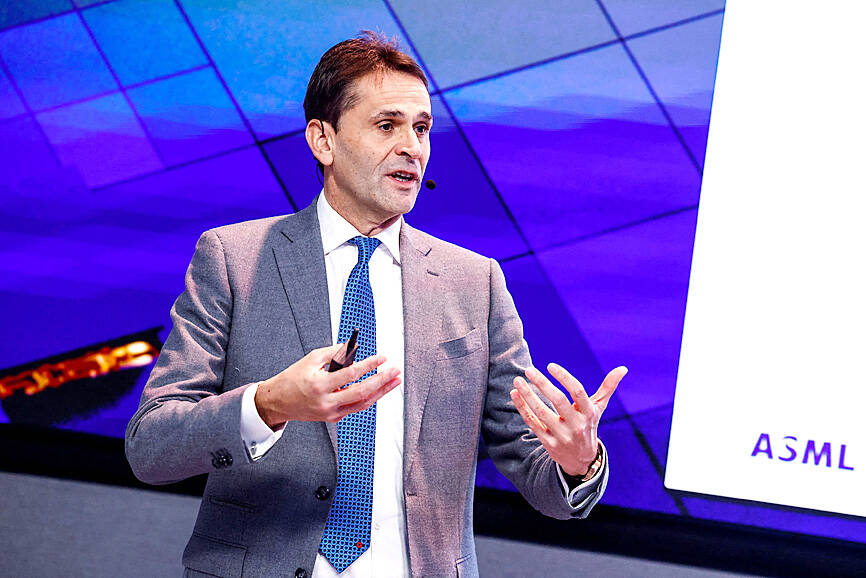ASML Holding NV, the sole producer of the most advanced machines used in semiconductor manufacturing, said geopolitical tensions are harming innovation a day after US President Donald Trump levied massive tariffs that promise to disrupt trade flows across the entire world.
“Our industry has been built basically on the ability of people to work together, to innovate together,” ASML chief executive officer Christophe Fouquet said in a recorded message at a Thursday industry event in the Netherlands.
Export controls and increasing geopolitical tensions challenge that collaboration, he said, without specifically addressing the new US tariffs.

Photo: Reuters
Tech executives in the EU, which is set to be hit with a 20 percent rate, are still working out the impact to their businesses and supply chains.
ASML is in a unique position, making the most advanced machines used in chip production, known as extreme ultraviolet (EUV) lithography tools. Without ASML’s machines, it becomes impossible for semiconductor companies to produce the chips necessary for high-end smartphones and computers.
While the tariffs announced on Wednesday exclude semiconductors, they make no mention of chip manufacturing tools.
An ASML spokeswoman declined to comment on how those tariffs could affect the company. The near-term direct impacts could be limited, according to Thornburg Investment Management.
Last year, about 16 percent of ASML’s net sales came from customer facilities in the US, according to the company’s annual report.
Still, several key ASML customers — Intel Corp, Taiwan Semiconductor Manufacturing Corp (台積電) and Samsung Electronics Co, among others — are ramping up their US operations, with plans to build a slew of new chipmaking facilities in the coming years as Washington works to revitalize domestic semiconductor production.
One key incentive for that buildout is a 25 percent investment tax credit, part of the 2022 CHIPS and Science Act, that could be used to offset purchases of expensive chip manufacturing tools.
Trump’s so-called reciprocal tariffs hit allies and adversaries alike, with a reach that far exceeds any trade actions from his first term. That includes the Netherlands and several other key exporters of chip manufacturing equipment, such as Japan, which now faces a 24 percent tariff, and South Korea, against which the US levied 26 percent import duties, according to the annex accompanying Trump’s executive order.
The EU is preparing a package of retaliatory measures, Dutch Foreign Trade Minister Reinette Klever said, and individual countries have the opportunity to provide input.
“I met with the US trade representative in Washington a few weeks ago and there I stressed the importance of reciprocal trade and that remains our commitment in the future,” Klever said, declining to comment on whether the Netherlands would seek exemptions for ASML.

Jensen Huang (黃仁勳), founder and CEO of US-based artificial intelligence chip designer Nvidia Corp and Taiwan Semiconductor Manufacturing Co (TSMC, 台積電) on Friday celebrated the first Nvidia Blackwell wafer produced on US soil. Huang visited TSMC’s advanced wafer fab in the US state of Arizona and joined the Taiwanese chipmaker’s executives to witness the efforts to “build the infrastructure that powers the world’s AI factories, right here in America,” Nvidia said in a statement. At the event, Huang joined Y.L. Wang (王英郎), vice president of operations at TSMC, in signing their names on the Blackwell wafer to

France cannot afford to ignore the third credit-rating reduction in less than a year, French Minister of Finance Roland Lescure said. “Three agencies have downgraded us and we can’t ignore this cloud,” he told Franceinfo on Saturday, speaking just hours after S&P lowered his country’s credit rating to “A+” from “AA-” in an unscheduled move. “Fundamentally, it’s an additional cloud to a weather forecast that was already pretty gray. It’s a call for lucidity and responsibility,” he said, adding that this is “a call to be serious.” The credit assessor’s move means France has lost its double-A rating at two of the

AI BOOST: Although Taiwan’s reliance on Chinese rare earth elements is limited, it could face indirect impacts from supply issues and price volatility, an economist said DBS Bank Ltd (星展銀行) has sharply raised its forecast for Taiwan’s economic growth this year to 5.6 percent, citing stronger-than-expected exports and investment linked to artificial intelligence (AI), as it said that the current momentum could peak soon. The acceleration of the global AI race has fueled a surge in Taiwan’s AI-related capital spending and exports of information and communications technology (ICT) products, which have been key drivers of growth this year. “We have revised our GDP forecast for Taiwan upward to 5.6 percent from 4 percent, an upgrade that mainly reflects stronger-than-expected AI-related exports and investment in the third

RARE EARTHS: The call between the US Treasury Secretary and his Chinese counterpart came as Washington sought to rally G7 partners in response to China’s export controls China and the US on Saturday agreed to conduct another round of trade negotiations in the coming week, as the world’s two biggest economies seek to avoid another damaging tit-for-tat tariff battle. Beijing last week announced sweeping controls on the critical rare earths industry, prompting US President Donald Trump to threaten 100 percent tariffs on imports from China in retaliation. Trump had also threatened to cancel his expected meeting with Chinese President Xi Jinping (習近平) in South Korea later this month on the sidelines of the APEC summit. In the latest indication of efforts to resolve their dispute, Chinese state media reported that